Chemotherapy can be quite a grueling experience for the body and can take a toll on the hair. Unfortunately, most people getting cancer treatment find it difficult to cope with hair loss and don’t know what to expect.
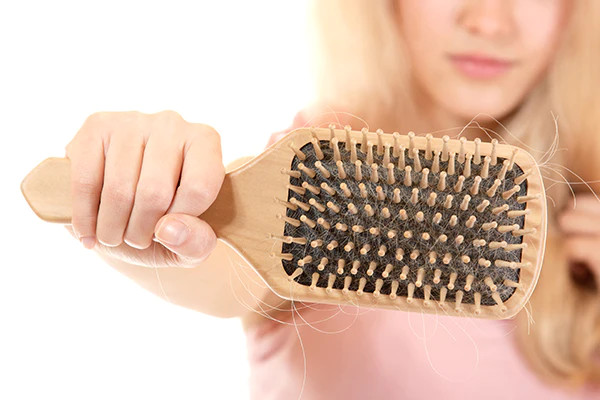
This article will address all your concerns about hair loss due to chemotherapy and how you can manage it.
Article Contents
Chemotherapy
Chemotherapy has many side effects, and hair loss is one of them. But don’t worry because in most cases, the shed hair will grow back after completion of chemo.
When chemotherapy is administered, the hair matrix cells get damaged, shutting down hair proliferation and causing thinning of the hair shaft. When chemotherapy is completed, the hair shaft production resumes but again is stopped in the next round of therapy. (1)
Unfortunately, in some cases, the hair won’t grow back, resulting in permanent alopecia after enormous doses of chemotherapy are administered. (2)
One such drug that causes permanent hair loss is docetaxel (Taxotere) when it is given at standard dosage. But not all chemotherapy drugs cause hair loss.
Chemotherapy Drugs That Cause Hair Loss
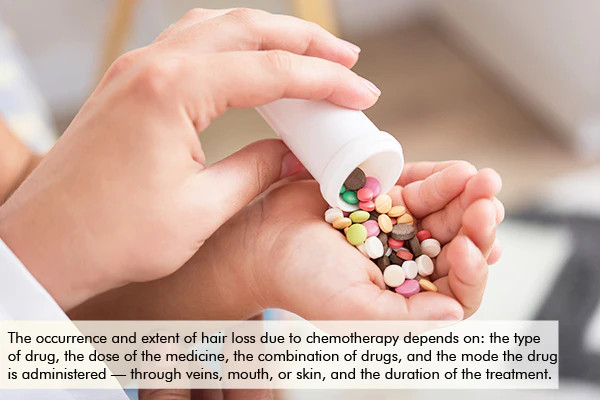
Chemotherapy drugs that cause hair loss include: (3)
- Cyclophosphamide (Procytox)
- Dactinomycin (Cosmegen)
- Daunorubicin (Cerubidine)
- Docetaxel (Taxotere)
- Doxorubicin
- Eribulin (Halaven)
- Etoposide (Vepesid)
- Idarubicin
- Ifosfamide (Ifex)
The occurrence and extent of hair loss due to chemotherapy depend on:
- The type of drug
- The dose of the drug
- The combination of drugs
- The mode the drug is given – through veins, mouth, or skin
- The duration of treatment
Why Does Chemotherapy Cause Hair Fall?
One of chemotherapy’s most visible and prominent side effects is hair loss or alopecia.
Chemotherapy refers to any cancer treatment that uses cytostatics. These cytostatic drugs quickly destroy rapidly dividing cancer cells or delay their growth.
In the process, they also kill healthy cells that divide quickly, such as those in the hair follicles that are responsible for hair growth, leading to hair loss. (4)
Signs and Symptoms of Hair Loss Due to Chemotherapy
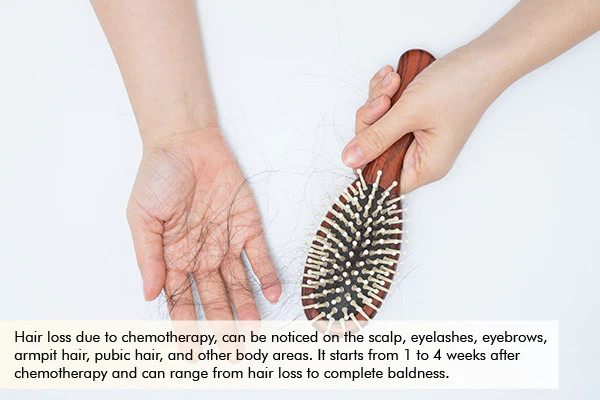
Hair loss due to chemotherapy can be noticed on the scalp, eyelashes, eyebrows, armpit hair, pubic hair, and other body areas. It starts from 1 to 4 weeks after starting chemotherapy and can range from hair thinning to complete baldness.
People undergoing chemotherapy notice their hair falling out in clumps while washing or combing it. (5)
Symptoms of hair loss due to chemotherapy can range from scalp pain to itching and tenderness when hair starts falling out. Apart from hair loss causing physical distress, the emotional pain is unbearable for many. (6)
Effect of Radiation Therapy on Hair
Hair loss is one of the side effects of radiation therapy when applied to the head. (7)
The amount of hair you will lose and whether it will grow back completely depend on the total area of the head being irradiated and the dose of radiation.
With smaller doses of radiation, there is a temporary hair loss that occurs, but permanent hair loss happens with higher doses of radiation. (8)
6 Ways to Manage Hair Loss Due to Chemotherapy
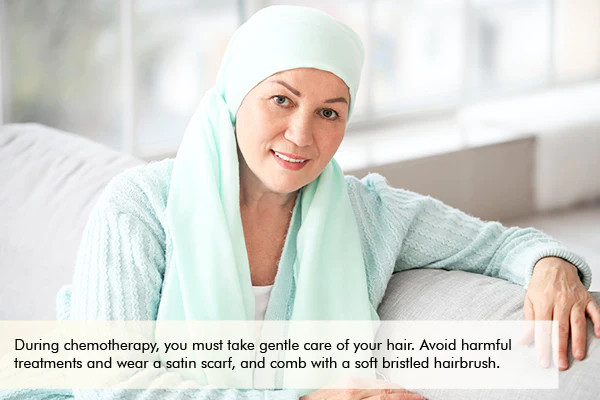
During chemotherapy, you must take gentle care of your hair. Here are some of the things you can do:
- Avoid harmful treatments such as bleaching, coloring, perming, and hot tools, and instead use mild hair care shampoos.
- Wear a satin scarf to protect your head during the day as it is soft and silky and won’t hurt your scalp. At night, use a satin pillowcase for sleeping as it will not catch fragile hair.
- Comb out your hair with a soft-bristled hairbrush.
- Wash your hair only when necessary using a gentle shampoo.
- Have a haircut or shave off your hair completely before chemotherapy starts, as short hair tends to look fuller than long hair, and hair loss is less noticeable when hair is shed.
- Use a scarf or wig to protect the scalp from the sun.
Do All Chemotherapy Patients Lose Hair?
The chemotherapy drugs mix administered depends on the type of cancer being treated. While some drugs cause hair loss, others will cause little to no hair loss.
There are also chemo treatments that don’t cause hair to fall out but only make it thinner or duller. (9)
Should I Shave My Head or Cut It Short Before Chemotherapy?
While it’s not necessary to cut or shave your head before starting chemo, it is often recommended.
Most people find it hard to go from long hair to a bald head, so cutting your hair short or shaving it entirely before chemotherapy helps.
Also, when your hair falls out, you won’t be losing big chunks of it, but relatively just short hair or stubble, which many people won’t mind losing.
When Will My Hair Start Growing Back After Chemotherapy?
Your hair will grow back after the completion of the chemotherapy treatment. In some cases, people notice immediate growth, while others take a month or two.
It is also possible that your hair will begin growing back during your treatment, before, or during your last chemo treatment.
It’s a myth that wearing wigs, hats, or scarves after chemotherapy stops the hair from growing back, as it will grow back with or without headwear.
Will My New Hair Look the Same as Before Chemotherapy?
The hair that grows back after undergoing chemotherapy often looks different from how it looked before. The color and texture may also appear different from before. (10)
If you had straight hair earlier, you might grow out curly hair and vice versa, but it is just temporary, and after a few months to a year, you will get your hair back.
Some people may experience a thicker hair growth than before, while others may find their hair softer and more delicate.
Factors such as hormone therapy for breast cancer treatment may also impact hair growth.
Can Hair Loss Be Prevented During Chemotherapy?
No treatment can guarantee that your hair won’t fall out during or after chemotherapy. Many treatments are under study to prevent hair loss. Some of them are:
1. Scalp cooling caps (scalp hypothermia)
During your chemotherapy, a closely fitted cap that has been cooled by chilled liquid is placed on your head to slow blood flow to your scalp. In this way, chemotherapy drugs have a lesser chance of affecting your hair and scalp. (10)
While cold caps work for some people, they don’t work for everyone. According to BreastCancer.org Trusted Source, they are effective for 50%–65% of women.
The DigniCap and Paxman cold caps were thoroughly studied and cleared by the US Food and Drug Administration for the market.
2. Minoxidil
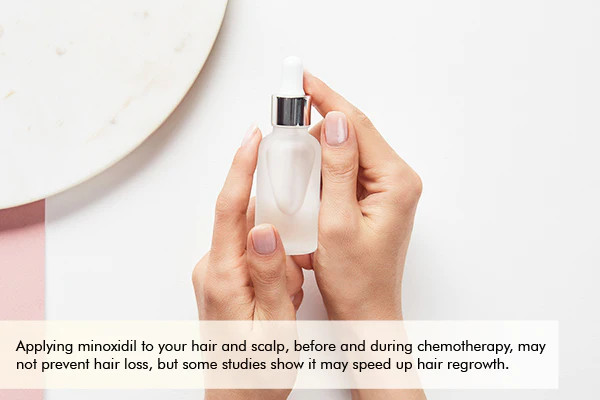
Applying minoxidil to your hair and scalp before and during chemotherapy may not prevent hair loss, but some studies show it may speed up hair regrowth.
More research is needed to substantiate claims that minoxidil effectively regrows hair after cancer treatment.
Final Word
Your new hair after chemotherapy will be highly fragile, so you should stay away from using hair color, styling products, and heating devices until it grows stronger.
Be patient as your old hair will come back slowly, and with time the damage to your hair caused by chemotherapy will be reversed.
References
- Haslam IS, Smart E. Chemotherapy-induced hair loss: The use of biomarkers for predicting ALOPECIC severity and treatment efficacy. Biomarker insights. https://www.ncbi.nlm.nih.gov/pmc/articles/PMC6475836/. Published April 17, 2019.
- Miteva M; Misciali C; Fanti PA; Vincenzi C; Romanelli P; Tosti A; Permanent alopecia after systemic chemotherapy: A clinicopathological study of 10 cases. The American Journal of dermatopathology. https://pubmed.ncbi.nlm.nih.gov/21430504/.
- Martín M, de la Torre-Montero JC, López-Tarruella S, et al. Persistent major alopecia following adjuvant docetaxel for breast cancer: Incidence, characteristics, and prevention with scalp cooling. Breast cancer research and treatment. https://www.ncbi.nlm.nih.gov/pmc/articles/PMC6133184/. Published October 2018.
- PE; BTONNTJH. ‘atrophic telogen effluvium’ from cytotoxic drugs and a randomized controlled trial to investigate the Possible Protective Effect of pretreatment with a topical vitamin D analogue in humans. The British journal of dermatology. https://pubmed.ncbi.nlm.nih.gov/16029334/.
- Ting PT, Barankin B. Patches of hair loss on the scalp. Canadian family physician Medecin de famille canadien. https://www.ncbi.nlm.nih.gov/pmc/articles/PMC1781504/. Published August 2006.
- Christopher C. Muth MD. Chemotherapy and hair loss. JAMA. https://jamanetwork.com/journals/jama/fullarticle/2601504/. Published February 14, 2017.
- Phillips GS; Freret ME; Friedman DN; Trelles S; Kukoyi O; Freites-Martinez A; Unger RH; Disa JJ; Wexler LH; Tinkle CL; Mechalakos JG; Dusza SW; Beal K; Wolden SL; Lacouture ME; Assessment and treatment outcomes of persistent radiation-induced alopecia in patients with cancer. JAMA dermatology. https://pubmed.ncbi.nlm.nih.gov/32756880/.
- Lee S. Hair loss. Canadian Cancer Society. https://cancer.ca/en/treatments/side-effects/hair-loss.
- Rossi A, Fortuna MC, Caro G, et al. Chemotherapy-induced alopecia management: Clinical experience and practical advice. Journal of cosmetic dermatology. https://www.ncbi.nlm.nih.gov/pmc/articles/PMC5540831/. Published December 2017.
- Hair loss in chemotherapy: Overview – NCBI Bookshelf. https://www.ncbi.nlm.nih.gov/books/NBK547552/.







